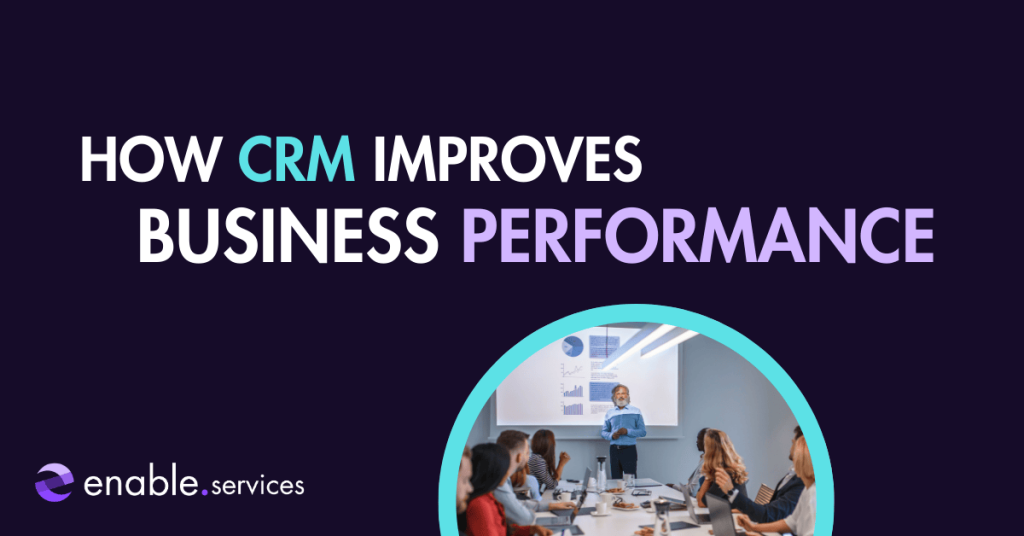How CRM Improves Business Performance

A CRM system can make a positive impact on your business by being a time-saving asset within a range of processes. When directors book their 1-1’s with new and existing employees, it’s reassuring to know that they are trained with equipment they can rely on. enable.services can help you choose the right CRM early in the process, so you don’t have to change equipment last-minute or hire extra IT help.
Modern CRMs go far beyond what they say on the tin. They handle half of the workload so that a business can focus on what matters: the relationship and service. Let’s explore how CRM improves business performance through the lens of hybrid operations, responsiveness, smarter decision-making, and trusted marketing.
1. Hybrid business options
Competitors have been embracing hybrid business models in recent years — combining in-person, digital, and remote services. And there is nothing wrong with keeping up with the neighbourhood! CRM platforms support this flexibility by keeping all contact information, meeting logs, and sales insights in one place, accessible from anywhere.
Here’s how CRM enables hybrid and remote success:
- Sales reps can engage clients whether they’re in the office, on the road, or working remotely.
- Customer service teams can maintain continuity across online and offline channels.
- Management can track performance in real-time without being on-site.
Nationwide customer service helps customers receive the best support they need, not limited to the location they are in.
2. Faster response times
Speed matters in today’s digitally-enhanced shopping environment. CRM systems provide instant access to previous interactions in detail, historical purchases, and live customer issues so that teams can respond quickly.
The benefits of faster response times:
- Increased customer satisfaction and retention
- Improved team coordination with shared visibility
- Automated alerts for follow-ups, reducing delays
- No repeat payments or refunds
Whether it’s a sales question, support issue, or product query, a CRM holds the data on stand-by for an approaching customer.
3. Faster sales guidance & decision making
Recording activity times and sales history boosts future relationships and merchandising. Sales managers can easily identify which leads are most likely to convert, which team members need support, and where to focus their efforts.
Key advantages include:
- Smarter forecasting with visual sales pipelines
- Real-time dashboards for decision-making
- Automated reports and KPI tracking.
This level of visibility drives quicker, more confident decisions — both on the sales floor and in the boardroom, ultimately saving on accounting costs.
4. Trusted marketing strategies
Effective marketing is about reaching the right people with the right message — and data in your CRM holds all the right keys. With the help of customer data and segmentation, businesses can craft campaigns based on real behaviours and preferences.
CRM enhances marketing by:
- Enabling precise audience segmentation
- Personalising content and outreach
- Tracking campaign performance across channels.
With a data-driven approach, marketing becomes less guesswork and more strategy — building trust with customers and maximising ROI.
5. Flexible opening hours - Serve to demand
CRM tools also allow businesses to hop their time and operations to meet customer demand. For example, if a business notices high engagement during evenings or weekends, it can adjust its availability accordingly.
CRM supports flexible operations by:
- Tracking peak contact times
- Aligning staff schedules with customer behaviour
- Offering automated responses outside business hours
This responsiveness gives businesses a competitive edge and meets customers where they are – whenever they need support. Phone and meeting notes on cases ensure that customers don’t have to repeat themselves or potentially return to the store at inconvenient times.
Conclusion
A CRM system is more than just a tool — it’s a catalyst for an up-to-date business model. By enabling hybrid work, speeding up customer service and sales decisions, enhancing marketing, and adapting operations to demand, CRM helps businesses perform smarter, faster, and in sync with popular technology.
For companies who are building a heavy-duty business model with immaculate data storage, investing in the right CRM could be your next best move.



